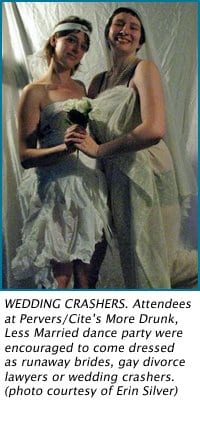Pride in Montreal is one of the biggest parties in North America, and every year the Divers/Cite festival pulls out all the stops. The party shuts down streets with outdoor concerts, drag shows and all-day dance parties.
But clubs jack up their cover prices, and official parties cost close to $100 per ticket. Some in the queer community feel that Divers/Cite is becoming increasingly corporate and that the organization has turned its back on queer history. Critics point to 2007, when Divers/Cite cancelled the annual parade and community day. In reaction, a group called Pervers/Cite has organized an alternative Pride, with panels, workshops and parties that touch on themes ignored by the mainstream Pride celebrations.
According to their website, part of the mandate of Pervers/Cite is to “oppose the queer community’s total assimilation into mainstream kkkanadian culture, as well as to foreground both a local history of queer radicalism and social issues faced by queers today that are consistently glossed over by the gaystream media in favour of double-groom cakes and shopping holidays.”
This year, panels and workshops discussed themes from queer prisoners to mental health in the queer community, and there were independent film screenings, a book fair and a historical walking tour of queer Montreal. The main event of the week was a huge party called More Drunk, Less Married, presented by the Q-Team, a working group of QPIRG McGill and QPIRG Concordia.
Judging by the success of the Pervers/Cite events — all of which were well attended — this alternative Pride clearly fills a need in the city of Montreal. Xtra.ca spoke with one of the members of both the Q-Team and the Pervers/Cite collective, Doreen Grey, about the radical opposition to gay marriage and the theme of the party.
Xtra.ca: Gay marriage is often seen as a huge victory for the movement, why would any gay or queer people be against marriage?
Doreen Grey: There are so many different but equally valid issues that queer people and all people have with marriage, from its assimilationist aspirations to its patriarchal nature, to its consumerist drive. For me, the push to legalize gay marriage is a movement that privileges the needs of people who already quite privileged in many respects, while leaving everyone else out of the picture.
Xtra.ca: Why did you decide to throw this More Drunk, Less Married party? Can you explain the reasoning for the choice of the name of the party?
Doreen Grey: We wanted to have a party that coincided with Divers/Cite, but drew attention to and was critical of how the gay agenda is increasingly mainstream. Pervers/Cite generally, and the queercore anti-marriage party specifically, were about opposing gay assimilation, and remembering that queer history is a history of resisting dominant forms of power, not participating in them. The exact name… was just for the funny costumes.
Pervers/Cite.
Facebook group.
Perverscite.org.

 Why you can trust Xtra
Why you can trust Xtra


